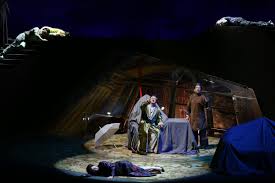London Coliseum, Thursday 11 August 2016
In a world of instant communications and video links we may think we have a good understanding of culture across the planet but there are times when actually encountering the unfamiliar can be a shock. Last night Shanghai Opera House brought Mo Fan’s Thunderstorm for its first performance in the United Kingdom. Written in 2007, it is billed as a modern opera – a term frequently used to warn any potential audience that it will probably be discordant and contain high levels of discomfort and challenge. This is not however the way the word is used by the Chinese company. It simply means this is a contemporary composition but here any idea of modernity ends. Mo Fan is a wide ranging composer with many film scores to his name and his style is relentlessly tuneful. To give a flavour of what we encountered may I suggest an episode of Eastenders set to a score based on Star Wars. If that seems unduly dismissive it will give some understanding of why many in the audience around me found it difficult to control their laughter as the evening progressed. There was a total mismatch between the constant tunefulness of the score and the supposed emotional interaction of the characters.
Based on a play by Cao Yu, the plot revolves around a family overseen by a dictatorial father who has had an illegitimate son who in turn is now in love with a maid who turns out to be his sister, as her mother is still alive. As a plot this has operatic potential but for a western audience it needs a score which supports the emotional content. While the writing is highly lyrical it does not aid the emotional nuances, seeking rather to bombard its listeners with volume rather than subtlety. The only music which really fitted the character was the sailor songs for Chong at the opening of each act. Beautifully sung and well-crafted these stood out and were appreciated by the audience. For much of the rest of the evening there was a wash of emotional mood setting with little sense of direction. It did not help that the composer had added in a chorus who stood at the sides and emoted, or worse still sang off-stage to heighten the tension at key moments – an effect lost by over-use.
The key role of the mother, Fanyi, comes across with the intensity of Klytemnestra but the vocal line of a second rate musical, her histrionics hurled across the foot lights whenever she became excited.
The stage design was conventional and while the projections worked well it was poorly lit for most of the evening, with banks of front-of-house lighting cutting through any hope of sensitivity.
While it was fascinating to encounter this live – and many thanks to those who brought it to us – I doubt if works of this type could ever survive within the current western cultural environment. Where we have moved on, and modern means challenge if nothing else, Shanghai seems stuck in a 1950s time-warp.

